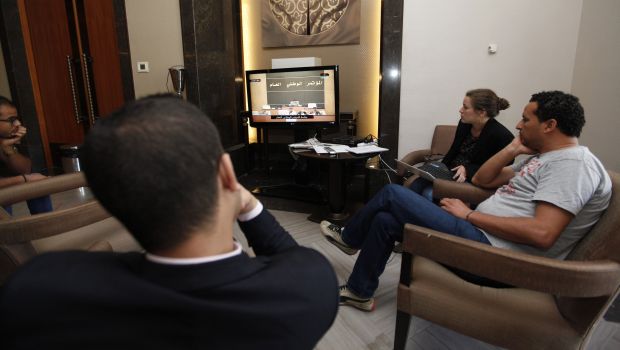
Reporters watch a live feed of Libyan members of parliament meeting to decide on the new prime minister at the parliament in Tripoli on May 4, 2014. (Reuters/Ismail Zitouny)
Tripoli, Reuters—The head of Libya’s parliament has confirmed businessman Ahmed Maiteeq as the country’s new prime minister, according to a decree signed by him on Monday, one day after a deputy speaker had declared Maiteeq’s election invalid.
The divisions in the assembly highlight growing political turmoil in Libya, where the government and parliament are unable to assert their authority in a country awash with arms and militias from the 2011 ouster of Muammar Gaddafi.
Maiteeq was elected on Sunday following chaotic voting in parliament, but First Deputy Speaker Ezzedin Al-Awami initially said the businessman had failed to obtain the necessary quorum.
On Monday, the president of parliament, Nouri Abusahmain, confirmed that he had asked Maiteeq to form a new government within two weeks, according to the decree posted on parliament’s website. Abusahmain wields quasi-presidential powers.
Political analysts said Maiteeq would have difficulty in overcoming the political chaos racking the oil-producing nation.
Since the civil war that ended Gaddafi’s one-man rule, Libya’s nascent democracy has struggled, with its parliament paralyzed by rivalries and brigades of heavily armed former rebels challenging the new authorities.
The prime minister’s post became vacant after Abdallah Al-Thinni resigned last month citing an attack by gunmen on his family just a month into his term as head of the government.
Thinni’s short-lived tenure followed that of Ali Zeidan who fled the country after he was fired by deputies over his failure to stop attempts by rebels in the volatile east to sell oil independently of Tripoli’s government.
Libya’s parliament, the General National Congress, is deadlocked between Islamists, tribes and nationalists. The country’s fledgling army faces challenges from unruly ex-rebels, tribal groups and Islamist militants.
